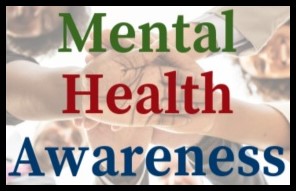
Our Mental Health Awareness series continues as we discuss schizophrenia and related disorders.
First of all, we want to tell you what schizophrenia is not. It is not the same as having 'split' or multiple personalities. Looking at the origin of the word, we can see why people mistakenly confuse split personalities with schizophrenia. The first part of the word, "schizo-, opens a new window," comes from a Greek word meaning a split or a division. The second part, "-phrenia, opens a new window" comes from the Greek word for mind or brain. The split, or break, that occurs in the minds of those of us with schizophrenia, is not a split personality disorder. It is a psychotic break -- a disconnect from the rational mind.
In general, a person receives a diagnosis of schizophrenia only after experiencing a psychotic break. However, there are early warning signs that can indicate an impending psychotic break. Please consult a physician if you are having any of these early warning signs:
- unable to concentrate or think clearly
- suspicious of people for no logical reason
- seeing or hearing things that no one else can (hallucinations; confused perceptions)
- pulling away from loved ones and spending increasing amounts of time alone
- neglecting hygiene habits and avoiding self-care
- having intense or sudden beliefs that most other people consistently claim are not true (delusions; confused beliefs)
Those of us who have schizoaffective disorder, opens a new window experience a combination of schizophrenia symptoms and mood disorder symptoms. If we have schizophrenia in addition to a depressed mood, we may feel sad and worthless. If we have a 'manic' mood along with schizophrenia, we may have racing thoughts and feel extreme happiness.
Some of us may experience a psychotic disorder, opens a new window. In the book "Psychosis and Schizophrenia in Adults: Treatment and Management, opens a new window," available online from the National Library of Medicine, the authors state, "The early stages of psychosis and schizophrenia are often characterized by repeated exacerbation of symptoms such as hallucinations and delusions and disturbed behavior."
It is our belief that people who suffer from schizophrenia and other psychotic disorders are stigmatized far more often than people with any other mental health disorder. The article "Schizophrenia Stigma and Violence, opens a new window," by Rashmi Nemade and Mark Dombeck states "Today, when schizophrenia is mentioned in the news, it is almost always in connection with some alarming crime . . . While there are certainly violent and murderous people who have schizophrenia and related mental illnesses, such individuals make up only a very small portion of the population of chronically mentally ill people. The vast majority of mentally ill people, including schizophrenic people, are non-violent people who never cause problems of this sort."
According to the National Alliance to End Homelessness, opens a new window, "Schizophrenia affects a little more than 1 percent of the U.S. population, but it’s much more prevalent among homeless persons. Estimates are wide ranging, but some go as high as 20 percent of the homeless population. That’s thousands of people living with schizophrenia and experiencing homelessness each day."
Please note: This discussion of schizophrenia and related disorders is intended for informational purposes and is not meant to take the place of consultation with a physician.
For those of us with schizophrenia or any mental illness living in the greater St. Tammany Parish area who need to find a treatment plan, a place to stay, or other necessities, please visit the NAMI St. Tammany Resources, opens a new window search page. If you are interested in taking part in a nearby mental health support group, visit this page, opens a new window from NAMI St. Tammany for more information.
If you or someone you know has symptoms of schizophrenia and needs help, please try one of these hotlines:
- The MentalHelp.net Hotline, opens a new window: 1-888-993-3112
- Schizophrenia and Related Disorders Alliance of America, opens a new window: 1-800-493-2094
- NAMI, opens a new window Helpline: 1-800-950-6264 available Monday - Friday, 9 am - 5 pm CST
- The National Suicide Prevention Lifeline: 1-800-273-8255 or text "HOME" to 741741 or visit this site, opens a new window for online chat help
- The SAMHSA Disaster Distress Helpline, opens a new window at 1-800-985-5990 or text "TalkWithUs" to 66746. SAMHSA (Substance Abuse and Mental Health Services Administration) also provides a place to search for treatment services at this site, opens a new window.
We have put together a list of St. Tammany Parish Library resources and external websites that have additional information about schizophrenia and related disorders. If you are interested in any of the titles on this list, please contact your nearest St. Tammany Parish Library reference librarian, opens a new window for assistance.



Add a comment to: Mental Health Awareness: Schizophrenia and Related Disorders